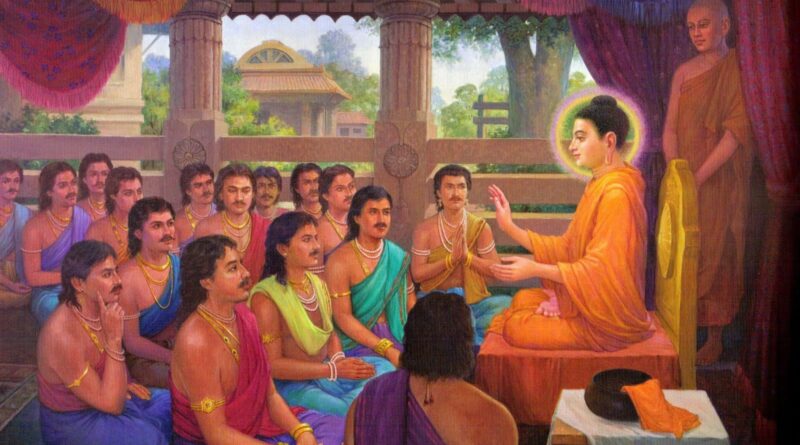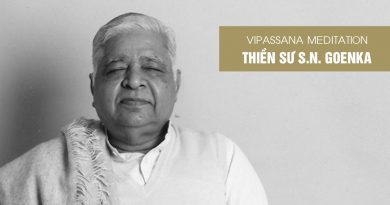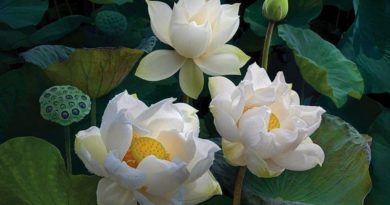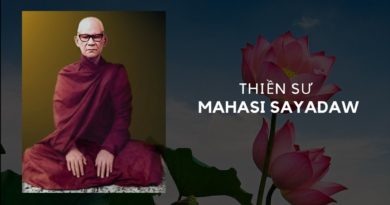The Buddha: Dispenser Of Happiness
MAIN CONTENT
The Buddha: Dispenser of Happiness
(The following is an extract from “Was The Buddha A Pessimist?” in which Goenkaji has sought to dispel prevailing misconceptions about the Buddha and his teaching.)
From the assertion that his philosophy and teachings were nothing but suffering and misery, the implication is that the Buddha himself was miserable and unhappy. Nothing could be further from the truth. As a perfectly Enlightened One, the Buddha had come out of all the miseries of the world, and lived a life full of contentment and infinite happiness in every situation.
To others also he gave nothing but happiness. The Buddha was always happy.
Once he was sleeping on a bed of dry leaves fallen from a tree on a cattle path in Alavī. At that time an Ālavaka prince named Hatthaka had set out for a stroll. When he saw the Buddha, he asked, “Venerable sir, did you sleep happily?”
The Buddha replied, “Yes, young man, I slept well. I am one of those people in the world who sleep happily.”
To this Hatthaka said, “This is a cold autumn night, the season of snowfall. The hooves of cows have made the land coarse and uneven. The bed of leaves is thin. There are very few leaves on the tree. A cold wind is blowing from all directions and you have but tattered clothes on you. How could you sleep happily?”
The Buddha replied, “A householder or a son of a householder sleeps in a proper house on a soft bed with pillows and blankets. However, the fire of craving for sensual pleasure may be burning inside him. In that case, smoldering in the heat of desire, he sleeps in misery. A Buddha has extinguished all his craving-destroyed it, uprooted it, put an end to it forever, like the severed trunk of a palm tree, from which new leaves cannot grow. Craving does not exist in the Buddha. It cannot arise in a Buddha. The Buddha is an arahat. An arahat always sleeps happily.”
A similar incident:
When Anāthapindika went to see the Buddha in Rājagaha for the first time it was very late in the night. The Buddha was taking a walk in the open. Anāthapindika asked him, “Venerable sir, Exalted One, did you sleep happily?”
The Buddha replied:
“Sabbadā ve sukham seti, brāhmano parinibbuto; Yo na limpati kāmesu, sītibhūto nirūpadhi”.
-Detached and dissociated from all sensual cravings and cooled, the brāhmana (arahat) having experienced nibbāna always sleeps happily.
Then he added-
“Sabbā āsattiyo chetvā, vineyya hadaye daram; Upasanto sukham seti, santim pappuyya cetasā”.
-Having destroyed all desire, having removed fear from the heart, having acquired true peace of mind, a liberated detached arahat indeed sleeps happily.
Not only arahats, every follower of Dhamma sleeps happily. Therefore it is said:
“Dhammacārī sukham seti”.
-A practitioner of Dhamma sleeps happily.
Ascetics who have renounced the worldly life and are steadfast on the path of Dhamma always sleep happily: sukham supanti muniyo.
Everyone whose mind vibrates with the thrilling rapture of Dhamma certainly sleeps happily: Dhammapīti sukham seti, vippasannena cetasā.
Well contented with the ambrosia of Dhamma (one) always sleeps happily: sukhito dhammarasena tappito.
A Buddha is dhammabhūto (Dhamma personified), brahmabhūto (brahma personified); completely cooled. He always sleeps happily. All the arahats who followed his teaching and attained liberation achieved happiness.
One more example:
Bhaddiya was from the Sākyan royal family. He was ordained by the Buddha. He often uttered the words “Aho sukha, aho sukha!” (“O happiness, O happiness!”), spontaneously under the shade of a tree or in the darkness of his meditation cell.
The Buddha called him and asked him, “Bhaddiya, why do you utter these joyous words?”
Bhaddiya answered, “Venerable sir, earlier when I was a king, the royal guards were constantly near me-whether I was in my private chambers or outside; in the city or outside its limits; in the district or beyond the district. Venerable sir, I lived hidden behind these guards with constant fear and worry in my mind. On the other hand, I now live alone in the jungle, at the root of a tree or in a cell, serene, always free from fear, free from doubt, not craving anything, peaceful and trusting in mind, satisfied with whatever I get through alms. Venerable sir, observing this change in me, I utter these words of joy: “Aho sukha, aho sukha!”
A disciple of the Buddha always dwells happy.
“Adahyamānena kāyena, adahyamānena cetasā; Divā vā yadi vā rattim, sukham viharati tādiso”.
-He experiences the burning of sensual craving in neither mind nor body. Thus, day and night he lives happily.
Arahat bhikkhu Angulimāla proclaimed:
“Sukham sayāmi ṭhāyāmi, sukham kappemi jīvitam; Ahatthapāso mārassa, aho satthānukampito.”
-I sleep happily, dwell happily and spend my life in happiness. I am free from the bondage of death. Ah, this happened because of the Lord’s compassion!
As long as there is the burning of craving or anger, there is no happiness. One lives a happy life only after gaining liberation from craving and anger. Anyone who generates anger becomes miserable. But with the practice of Vipassana as taught by the Buddha, the same person-
Kodham chetvā sukham seti, kodham chetvā na socati.
-Having put an end to anger, sleeps happily; having put an end to anger, lives without grief.
Eternal happiness of nibbāna
Hārita was a bhikkhu who had gone forth from a Brahmin clan of Sāvatthi. These are his delightful words upon attaining liberation –
“Susukham vata nibbānam, sammāsambuddhadesitam; Asokam virajam khemam, yattha dukkham nirujjhati.”
-Indeed, the nibbāna taught by the Perfectly Enlightened One is ultimate happiness. It is without grief, without blemish, secure. All miseries completely end there.
Joyful path to true happiness
Aggika Bhāradvāja, a Brahmin from Ukaṭṭhā, was a worshipper of fire. He used to undergo severe penances in the jungle by torturing his body. After coming in contact with the Buddha, he learned Vipassana. And after practice of the technique for a few days, he became liberated and attained the stage of arahat. When friends asked him about it, he replied,
“Yam sukhena sukham laddham, passa dhammasudhammatam; Tisso vijjā anupattā, katam buddhassa sāsanam.”
-(Leaving the path of torture), I have attained (the ultimate) happiness (of nibbāna) using this joyful method. Behold the greatness of Dhamma! (Reaching the state of an arahat) I have attained the three supernatural powers. I have completed the practice of the Buddha’s teaching!
Happiness even for householders
When a householder established in the teaching of the Buddha gave away his daughter in marriage, he gave her this advice:
Sit happily; eat happily; sleep happily.
And he explained how to do it: To fulfill the responsibilities of a daughter-in-law in the new home is conducive to happiness. If one’s elders are standing, one should: take a seat only after they have sat down; take meals only after serving food to the elders; and go to bed only after serving and fulfilling the needs of the elders in the family-these are all conducive to happiness.
For householders, the words of the Buddha are full of abundant benediction for their happiness.
Some examples:
Sukhā metteyyatā loke, atho petteyyatā sukhā – Serving one’s mother and father results in happiness in the world.
Sukhām yāvajarāsīlam – Following morality until old age brings happiness.
Sukhā saddhāpatitthitā – Having confidence in the Truth brings happiness.
Sukho paññāya patilābho – Development of wisdom brings happiness.
Pāpānam akaranam sukham – Abstaining from evil brings happiness.
Athamhi jātamhi sukhāsahāyā – Help from friends and relations when one is in need brings happiness.
Tutthī sukhāyā itarītarena – Remaining content with what one has brings happiness.
Puññam sukham jīvitasankhyamhi – Meritorious deeds bring happiness even after death.
Sabbassa dukkhassa sukham pahānam – Eradicating all suffering (through the practice of Vipassana) brings happiness.
It is clear that the Buddha’s teaching conveyed not only the ultimate happiness of liberation from the cycle of birth and death, but also what brings happiness in mundane life. How misguided to call him a pessimist!
A Buddha arises in the world to distribute happiness
“Buddho loke samuppanno, asamo ekapuggalo; So pakāseti saddhammam, amatam sukhamuttamam”.
-The peerless, remarkable Buddha arises in the world and brings into light the Truth, the Dhamma. The Buddha brings into light eternal and supreme happiness.
Therefore it is said:
Sukho buddhānam uppādo, sukhā saddhammadesanā; Sukhā sanghassa sāmaggī, samaggānam tapo sukho.
-Happy is the arising of a Buddha, happy is the teaching of Dhamma, happy is the coming together of Sangha and happy it is to meditate together!
A Buddha distributes nothing but happiness.
What to talk of a Buddha, even the arising of any saint in the world is rare:
Dullabho purusājañño, na so sabbatthajāyati.
-Rare is a saint in this world. He does not take birth everywhere.
Yattha so jāyato dhīro, tam kulam sukhamevatī
-Where a saintly person is born, that clan’s happiness increases.
An ordinary virtuous person is a cause of welfare of his clan. However a Buddha is a cause of welfare for all humanity. He preaches the benevolent Teaching, by following which people can live peaceful and happy lives, full of the truth-based Dhamma.
Dhammārāmo dhammarato, dhammam anuvicintayam; Dhammam anussaram bhikkhu, saddhammā na parihāyati.
-Living Dhamma, engrossed in Dhamma, thinking only of Dhamma and always mindful of Dhamma, a meditator bhikkhu never leaves the path of the truth-based Dhamma.
Such a meditator monk is:
Santakāyo santavāco, santavā susamāhito; Vantalokāmiso bhikkhu, upasanto ti pavuccati.
-Peaceful in body, peaceful in speech, master of a concentrated mind, leaving behind the worldly blemishes; such a peaceful bhikkhu is truly called a “calmed one”.
One, thus calmed, lives happily and sleeps happily.
Upasanto sukham seti.
-The “calmed one” always sleeps happily.
One who has attained ultimate peace has attained ultimate happiness. Ultimate peace is ultimate happiness. One who has attained nibbāna has experienced the ultimate bliss.
Natthi santi param sukham.
-There is no happiness greater than the peace of nibbāna.
Such meditators having attained ultimate peace live happily even in adverse circumstances.
Susukham vata jīvāma
-Ah, happily do we live;
Veriyesu averiyo
-Without hatred among enemies;
Āturesu anāturo
-Without affliction among the afflicted;
Ussukesu anussako
-Without attachment among those with attachment!
How does one attain this state of ultimate bliss?
Pavivekarasam pītvā, rasam upasamassa ca.
-Solitary meditation and drinking deeply the peace that comes from a serene mind.
Niddaro hoti nippāpo, dhammapītirasam pivam.
-Enraptured in the joy of Dhamma, a meditator becomes fearless and without any evil.
Such a meditator always lives happily. One who is without enmity becomes fearless. If one has a violent mind, full of enmity, then he will suffer the painful affliction that comes from hatred.
Yato yato himamano nivattati, tato tato sammati evam dukkham.
-Whenever the mind gives up violence, misery gets extinguished.
When misery is eradicated, life is full of happiness.
To attain this blissful peace, it is essential to undertake meditation. One must meditate in a solitary cell:
Suññāgāram paviṭṭhassa, santacittassa bhikkhuno; Amānusī ratī hoti, sammādhammam vipassati.
-A bhikkhu, who has retired to a solitary place, and with serene mind practices Vipassana in the right way, enjoys divine happiness.
His whole body is filled with the boundless rapture of bliss: Pītisukhena vipulena, pharamāno samussayam.
When one practices Vipassana properly, one experiences not only bliss in mind and rapture in body but also the happiness of the infinite peace of the deathless.
Yato yato sammasati, khandhānam udayabbayam; Labhati pīti pāmojjam, amatam tam vijānatam.
-Whenever one directs one’s attention anywhere within the body (understanding the contact of mind and body), one is aware only of arising and passing. One enjoys bliss and delight and experiences the deathless (which is the field of the Noble Ones).
This is the supreme happiness of nibbāna; this is supreme peace.
Source: VRIDhamma.org





